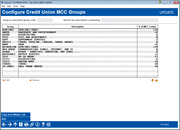Configure Credit Union Merchant Category Codes (MCC) Groups
| Screen ID: | UISMCSET-01 | 
|
| Screen Title: | Configure Credit Union MCC Groups | |
| Panel ID: | 6852 | |
| Tool Number: | 1024 | |
| Click here to magnify |
Access this screen by selecting Tool #1024 Configure Credit Union MCC Groups.
This tool is used to create merchant category code groups for your credit union both individually and from a master listing of code groups. Data center staff may configure the master codes and groups using a tool in the Support Toolbox (contact the CU*Answers Cards and Payments team for more information).
What is a Merchant Category Code?
These codes, referred to as MCC, are codes that are assigned to classify types of goods or services that consumers purchase with their plastics. MCCs are assigned by either merchant types, or by merchant name, and are assigned when a business starts accepting plastics. These codes are used to determine interchange fees, to define rules and restrictions (such as a gas pump authorization), and for tax purposes. From a CBX perspective, these codes present opportunities to provide granular cash back rewards programs based on spending types as well as opportunities to monitor transaction activity by CU-defined MCC groups. These codes also give valuable insights on where and how your members use their plastic.
What are these codes used for?
Merchant category codes are organized into groups in this tool.
Those groups are then used in analysis dashboards, credit card cash back reward programs, and abnormal activity monitoring.
Analysis Groups vs. Cash Back Program Groups vs. Abnormal Activity Monitoring Groups
For the most part, it will be unlikely that future enhancements will be determined by individual MCC Code - that's what these groups are for. As a result of this, you can create any many groups as you like, and can even include the same MCC code(s) in more than one group - and with this configuration freedom comes a certain caveat to consider.
Since both analysis dashboards as well as rebate programs will pull from the same set of CU-defined group codes, and none of these programs will have any mechanism for determining if a code is repeated in multiple groups, you may want to consider creating a set of generic groups for analysis purposes, but then also creating some very specific groups that you intend to use only for your cash-back or promo rate programs and groups you intend to use only for your abnormal activity monitoring.
As an example, you could create a group that only contains the MCC code for Delta Airlines, but you may also have a "TRAVEL" code that contains all airlines, including Delta. With the cash-back/rebate programs, you'll only be able to pick one group to give a special rate to, and "all other" codes will use a separate rate - so they could pay a 1% rate for Delta flights, say, and a different rate or even 0% on all other trans. (So there can be a max of two rates per cash-back/rebate program.) So these shouldn't have any problems with overlap or duplication.
However, analysis dashboards won't consider whether there's overlap or not. If you choose to analyze both the Delta group compared to your Travel group, the same Delta transactions would be included in both.
Our recommendation is to consider a special naming convention for groups intended for general use or analysis vs. ones that are specifically for your cash-back/reward/promo rate programs vs. ones that are specifically for your abnormal activity monitoring. (For example, you may include "AAM" in the names of the groups created for abnormal activity.)
Using this screen
To begin configuring MCC groups for your credit union, use Add or elect to Copy from Master List . You can also select a code to Edit, or highlight and select to Delete (a confirmation window will appear, select Delete again to complete the action).
When you are creating new MCC groups, remember credit union group codes cannot begin with the “#” symbol as it is reserved for master group codes.